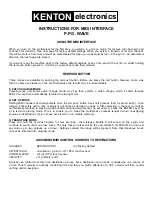
132
CHAPTER 10
The Vocoder
Q-FACTOR
The resonance parameter controls the quality of
the filter bands (like an equalizer’s q-factor). A
low quality factor of the carrier bank leads to a
fairly neutral reproduction of the carrier signal. A
higher quality creates a higher resonance in the
filter bands, which therefore make the overall
sounds more artificial.
VOCODER ATTACK
The attack time of the envelope follower. This
parameter controls how fast the carrier bands
react on a change of the modulator signal’s fre-
quency energy. Higher values result in a ”flab-
by”, lazy, even delayed response from the
vocoder.
VOCODER RELEASE
The release time of the envelope follower. This
parameter controls how fast the carrier bands
reflect if a certain frequency disappears from
the spectrum of the modulator signal. Here,
higher values result in a kind of sustain in the
carrier bands. High attack and release times
lead to less speech recognition, although it is
possible to create a really nice sounding syn-
thesizer pads with.
VOCODER SOURCE BALANCE
FILTER BALANCE creates a mixture of the voc-
oder signal and the modulator-respectively car-
rier signal. Turning FILTER BALANCE to the left
adds a certain amount of the carrier signal to
the vocoder signal. A turn to the right adds the
modulator signal.
Turning the FILTER BALANCE hard left or
right can be used to monitor the vocoder’s input
signals only.
VOCODER SPECTRAL BALANCE
Spectral balance between the higher and lower
frequencies of the vocoder signal. This parame-
ter works similar to a simple equalizer, which is
e.g. capable to increase the quality of speech.
The Spectral Balance highly influences the
overall character of the vocoder.
Several vocoder related parameters can be
modulated by LFO-1 and LFO-2
- LFO 1 RESO 1+2
modulates the bandpass
filter quality of the modulator and carrier
bank.
- LFO 2 FILT 1
modulates the bandpass filter
frequency of the carrier bank.
- LFO 2 FILT 2
modulates the bandpass filter
frequency of the modulator bank.
NOTES ABOUT THE VOCODER
The vocoder can also be controlled by any part
of the multimode. If more than one part of the
multimode contains an activated vocoder, only
the vocoder of the part with the lowest part
number is active.
As mentioned before, the whole filter section is
exchanged to the vocoder, parameters, param-
eters like saturation or the filter routing are not
available anymore.
If you would like to use the vocoder as an exter-
nal effect device, choose one external input in
the VOCODER MODE parameter page (modula-
tor signal) and the carrier signal by the INPUT
SELECT page.
Summary of Contents for Virus Rack XL
Page 1: ...ENGLISH VERSION ...
Page 3: ......
Page 7: ...ACCESS VIRUS RACK XL OS5 7 PDF VERSION RESTRICTIONS APPLY ...
Page 10: ...10 CHAPTER 3 ...
Page 11: ...Prologue ...
Page 14: ...14 CHAPTER 4 Prologue ...
Page 15: ...Introduction ...
Page 26: ...26 CHAPTER 5 Introduction Her is the filter routings capabilities of the Virus ...
Page 39: ...Concept and Operation ...
Page 56: ...56 CHAPTER 6 Concept and Operation ...
Page 57: ...The Parameters ...
Page 113: ...The Multi Mode Parameters ...
Page 118: ...118 CHAPTER 8 The Multi Mode Parameters ...
Page 119: ...The Global Parameters ...
Page 129: ...The Vocoder ...
Page 134: ...134 CHAPTER 10 The Vocoder ...
Page 135: ...The Virus and Sequencers ...
Page 142: ...142 CHAPTER 11 The Virus and Sequencers ...
Page 143: ...Tips Tricks Words Of Wisdom ...
Page 156: ...156 CHAPTER 12 Tips Tricks Words Of Wisdom ...
Page 157: ...Appendix ...
Page 188: ...188 CHAPTER 13 Appendix ...
Page 189: ...Index ...
















































